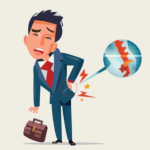TRAUMA I – Taking the Time to Recover
 At some point in our lives, many of us will be injured during an unexpected accident:
At some point in our lives, many of us will be injured during an unexpected accident:
- We stepped off a curb or lunged for a volleyball and sprained our ankle
- We fell and broke a bone
- We were holding onto the overhead strap of the bus, and hurt our shoulder when the bus suddenly lurched
And even though these injuries may need some investigation (an x-ray, a visit to the doctor, rest), over time and with management directed at settling down the acute symptoms, we gradually recover and are able to return to all our pre-accident activities.
There are other types of injuries however which are not a straight forward and may involve a more complicated recovery:
- Being injured in a motor vehicle accident, as a driver, passenger, pedestrian, or while riding any motorized vehicle
- Hitting our head when falling or playing sports
- Bodily assault due to domestic abuse, an unprovoked attack or altercation
- Injuries occurring during sports activities
The main difference between a more ‘straight forward’ injury, like a sprained ankle, and one which may result in a more protracted recovery, is that it is possible for different types of injuries to occur ‘at the same time’ – though you may not be able to SEE anything on the surface of your body. These can include:
- Soft tissue injuries like sprains and strains to muscles and joints
- Bleeding or damage to internal organs
- Fractures or hair-line cracks (deep inside)
- A traumatic brain injury (TBI) when the ‘force’ of the impact can cause movement of the brain within the vault of the skull, resulting in sensations other than pain
Management after a ‘Complicated Injury’
- If you are involved in a MVA, call the police, call an ambulance, and go to the hospital Emergency Department (ER) or see your family doctor. Ensure that the accident is reported and documented.
- If you are feeling lightheaded, nauseous, or off balance, it would be best to get an MRI of your brain. The physical effect of a TBI is usually ‘invisible’ a few days post trauma BUT if a brain scan can be obtained immediately after the accident, it may demonstrate some changes in the brain structure that were caused by trauma. (There are also currently ongoing clinical trials on concussion using blood samples.)
When you are home:
- The most important time to begin your recovery is to start immediately.
- Ask for help – the most important first step.
- Take time off work. (You may need to contact your employer, and/or have your doctor complete specific forms.)
- Ask family members or friends to help with housework, child-care, and food preparation.
- By paying attention to HOW you are feeling, your body will tell you WHAT to do and WHEN to do it.
- Use ice or heat to settle the acute discomfort, change position often, support yourself on as many pillows as you need to rest, take the occasional pain pill – to ensure you are able to sleep.
- As the injury pain settles, move more often, stay up for longer periods of time, work at household tasks for short periods of time.
- Be cautious about taking drugs like muscle relaxants and anti-inflammatory medication immediately after ‘new trauma’. It is best for your body to heal on its own – and in its own time.
- And, if you take prescription drugs for any conditions, speak to your family physician before you take any other drugs for pain or discomfort post-accident.
If you are not feeling you are recovering well on your own:
- Ensure that you stay in contact with your family doctor so that a record can be kept about ongoing problems/ symptoms.
- You may need further investigation by a healthcare professional who is experienced in treating post-trauma injuries.
- Though you may be able to feel and not see your injuries, it is possible that a TBI or ABI (traumatic or acquired brain injury) occurred at the same time as the accident.
- Symptoms or experiencing sensations like lightheadedness, nausea, as well as balance, vision, or speech difficulties need further investigation if they do not resolve after a few weeks.
- Worry, anxiety, fear, nightmares, insomnia, and flashbacks can result in long lasting problems if not addressed and managed properly by an appropriate therapist.
Future posts from Don’t Go to the Ouch! will address
- When to see a specialized health practitioner or professional
- Traumatic or Acquired Brain Injury: assessment, treatment, and management
An interesting short video on TRAUMA has been produced by Phoenix Australia. The information is useful for everyone, not only people who live in or sound like Australians :).

